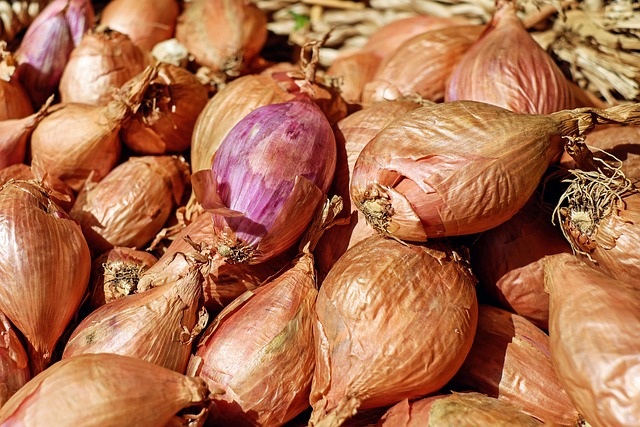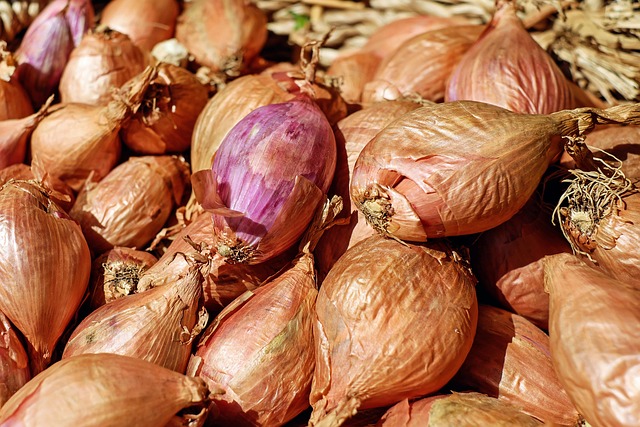-
Table of Contents
Top 7 Health Benefits of Eating Shallots Daily

Shallots, a member of the Allium family, are often overshadowed by their more popular relatives like onions and garlic. However, these small, flavorful bulbs pack a powerful punch when it comes to health benefits. Consuming shallots daily can contribute significantly to your overall well-being. In this article, we explore the top seven health benefits of incorporating shallots into your diet.
1. Rich in Antioxidants
Shallots are loaded with antioxidants, which are crucial for combating oxidative stress in the body. Oxidative stress can lead to chronic diseases such as cancer and heart disease. A study published in the Journal of Agricultural and Food Chemistry found that shallots contain higher levels of antioxidants compared to other members of the Allium family.
- Quercetin: A powerful antioxidant that helps reduce inflammation.
- Kaempferol: Known for its anti-cancer properties.
- Allicin: Provides antimicrobial benefits.
2. Supports Heart Health
Regular consumption of shallots can improve heart health by reducing cholesterol levels and blood pressure. The presence of allicin in shallots helps in lowering LDL cholesterol, while potassium aids in maintaining healthy blood pressure levels. A study in the American Journal of Clinical Nutrition highlighted that diets rich in Allium vegetables are associated with a reduced risk of cardiovascular diseases.
3. Enhances Immune Function
Shallots are a great source of vitamin C, which is essential for a robust immune system. Vitamin C stimulates the production of white blood cells, enhancing the body's ability to fight infections. Additionally, the antimicrobial properties of allicin further boost the immune response.
4. Promotes Digestive Health
The dietary fiber in shallots aids in maintaining a healthy digestive system. Fiber helps in regulating bowel movements and preventing constipation. Moreover, the prebiotic properties of shallots support the growth of beneficial gut bacteria, contributing to improved gut health.
5. Regulates Blood Sugar Levels
For individuals with diabetes or those at risk, shallots can be a beneficial addition to their diet. The sulfur compounds in shallots help in regulating blood sugar levels by enhancing insulin sensitivity. A study published in the Journal of Medicinal Food demonstrated that shallots could significantly lower blood glucose levels in diabetic patients.
6. Anti-Inflammatory Properties
Chronic inflammation is a precursor to many diseases, including arthritis and heart disease. Shallots contain flavonoids and phenolic compounds that exhibit strong anti-inflammatory effects. Regular consumption can help reduce inflammation and alleviate symptoms associated with inflammatory conditions.
7. Supports Bone Health
Shallots are a good source of essential minerals like calcium, magnesium, and phosphorus, which are vital for maintaining strong and healthy bones. These minerals work together to enhance bone density and reduce the risk of osteoporosis, especially in older adults.
Conclusion
Incorporating shallots into your daily diet can offer numerous health benefits, from boosting your immune system to supporting heart and bone health. Their rich antioxidant content and anti-inflammatory properties make them a valuable addition to any meal. Whether you enjoy them raw in salads or cooked in various dishes, shallots are a versatile and nutritious choice.
If you are dealing with specific health conditions, consider the following recommended supplements:
- Fat burn – Hepatoburn
- Weight Loss – Mitolyn
- Belly Fat – Sumatra Slim Belly Tonic
- Vision/Eyes/Sight – iGenics
- Hearing/Ears/Auditory – NeuroQuiet
- Brain & Memory – The Pineal Guardian
- Teeth & Dental Care – Provadent
- High Blood Pressure/Hypertension – Bazopril
- High Blood Sugar/Diabetes – Gluco6
- Urinary Flow/BPH/Enlarged Prostate – Total Control 24
- Testosterone – EndoPeak
- ED (Erectile Dysfunction) – ErecPrime
- Hair Loss/Hair Growth – TruVarin
- Menopause – MenoRescue
By making small dietary changes and considering appropriate supplements, you can enhance your health and well-being significantly.








